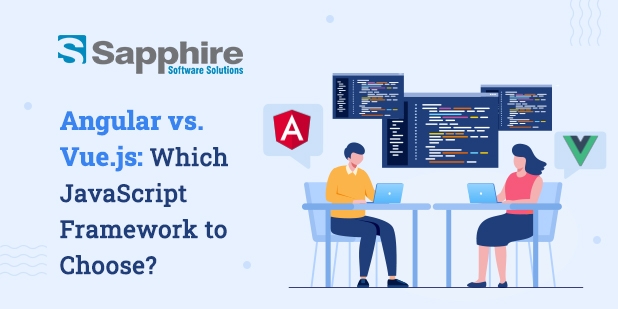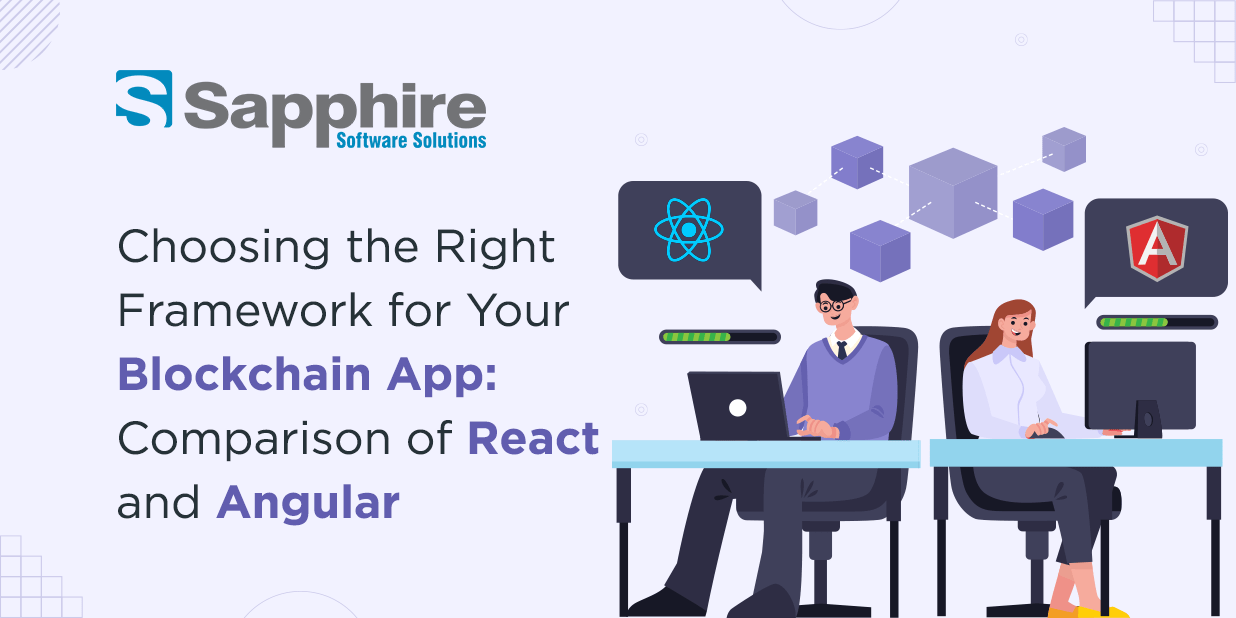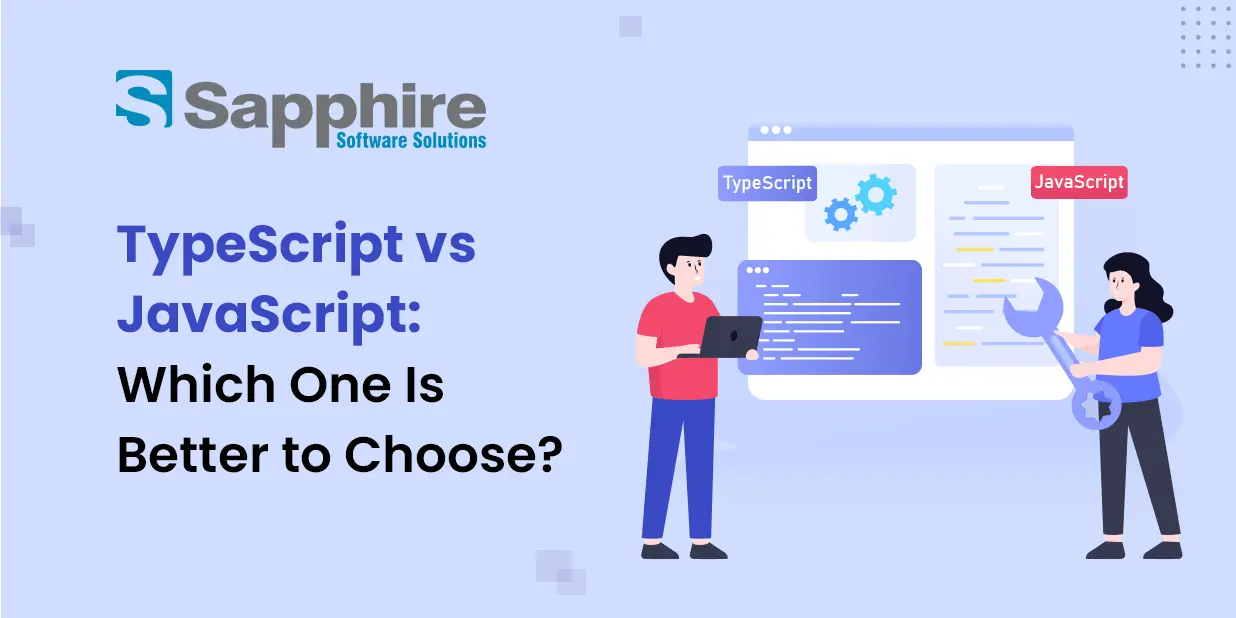JavaScript frameworks have become an essential component of contemporary web development because they provide developers with solid tools and abstractions that enable them to create online applications that are both dynamic and interactive. Angular vs Vue.js are two of the most popular JavaScript frameworks that have seen tremendous adoption and growth in recent years and are used by developers all over the globe.
Difference between Angular vs Vue.js:-
This comparison of Angular vs Vue.js across various criteria will be presented in this blog to assist you in making an educated opinion about the framework you will choose for your subsequent undertaking.
1. Overview of Angular and Vue.js:
Angular is a full-featured, opinionated framework for creating complex, enterprise-grade apps that Google created. It includes a full range of functionality for managing sophisticated application logic and state management and adheres to the Model-View-Controller (MVC) architectural pattern.
Vue.js is a progressive JavaScript framework that prioritizes simplicity and ease of use. It was developed by Evan You. Vue.js was named after its creator. Its component-based design lets developers gradually embrace its features as required. The emphasis on flexibility in Vue.js allows programmers to create apps of any scale.
2. The Slope of Learning:
Angular: Compared to Vue.js, Angular has a higher learning curve because of its extensive feature set and opinionated personality. Developers must comprehend various ideas, including dependency injection, modules, components, and services. However, Angular has thorough documentation and a vibrant community that may help with learning.
Vue.js: Developers can get up and running more quickly with Vue.js because of its easy learning curve. Because of its simple syntax and easy interface, developers with backgrounds in HTML, CSS, and JavaScript may quickly learn the fundamentals of Vue.js. The official Vue.js documentation is thorough and user-friendly for newcomers.
3. Performance:
Angular: Due to its complexity, Angular has a bigger footprint and more startup effort. Performance is improved, nevertheless, by Angular’s potent optimization methods, including Ahead-of-Time (AOT) compilation and tree shaking. Additionally, Angular has built-in support for lazy loading, which enables modules to be loaded as needed and cuts down on initial load time.
Vue.js: Compared to Angular, Vue.js has a lower footprint, which leads to quicker initial load times. It uses a Virtual DOM implementation for effective rendering, which reduces needless re-renders and improves efficiency. Additionally, Vue.js has an integrated caching system to enhance component rendering.
4. Both the Community and the Ecosystem:
Angular: Backed by Google, Angular has a sizable and engaged developer community that results in a wealth of materials, tutorials, and third-party libraries. An extensive selection of official and community-supported packages and technologies comprise Angular’s well-established ecosystem. Additionally, it gains from Google’s consistent upgrades and ongoing support.
Vue.js: Vue.js has been more well-liked recently, and its development community is expanding. Vue.js has a passionate and helpful community that actively contributes to the framework’s progress, even though it may not be as big as the Angular community. Additionally, Vue.js has a burgeoning community of modules and plugins that provide extra functionality.
5. Scalability:
Angular: Angular offers powerful tools for creating complex and maintainable codebases since it was built with large-scale applications in mind. It upholds rigid architectural principles that support modular development and scalability, such as separation of concerns and dependency injection. Scalability is further improved by Angular’s CLI (Command Line Interface), which provides reliable tools for producing code and controlling project structure.
Vue.js: Vue.js is appropriate for small to medium-sized apps; however, scaling it to more significant projects could need more work. Developers can choose their methodology because Vue.js does not impose rigid architectural patterns. Depending on the needs of the project and the team’s experience, this flexibility may be a benefit or a problem.
6. Experience with tooling and development:
Angular: Angular offers a full suite of development tools, including the command-line interface (CLI) for scaffolding projects and producing code. Additionally, it contains built-in support for TypeScript, a superset of JavaScript that is statically typed and improves code quality and developer efficiency. The development experience for Angular is further improved with tools for testing, robust IDE integration, and thorough debugging help.
Vue.js: Vue.js also provides various development tools, such as Vue CLI, which facilitates project setup and code production. With capabilities like time-travel debugging, hot module replacement, and Vue Devtools, Vue.js has an easy setup procedure and offers a great development experience. Although Vue.js supports TypeScript, developers may use plain JavaScript or other scripting languages like CoffeeScript.
7. Integration and Ecosystem Compatibility:
Angular: As a comprehensive framework, Angular provides extensive support for various aspects of web development, including routing, form handling, internationalization, and server-side rendering. However, Angular could need more work to interface with already-existing programs or third-party libraries that are not created for Angular.
Vue.js: Vue.js’s modular and adaptable design makes integrating with existing applications or frameworks simple. It may be incrementally included in an existing codebase without affecting the general architecture. Additionally, Vue.js offers official libraries for state management (Vuex) and routing (Vue Router), which work with Vue components.
8. Popularity and Job Market:
Angular: Due to its long existence and excellent user base, Angular is a preferred option for enterprise-level applications. Many businesses actively use Angular, particularly those developing complicated apps, which has led to a strong employment market for Angular developers.
Vue.js: Vue.js has quickly gained popularity, particularly among startups and small- to medium-sized projects. Many businesses have embraced Vue.js for their frontend development requirements because of its simplicity and ease of integration, attracting developers. The demand from businesses seeking Vue.js expertise drives a steady growth in the employment market for Vue.js developers.
9. Documentation and community support:
Angular: Angular has excellent community support, which is reflected in the abundance of tutorials, online tools, and documentation available for it. By actively participating in forums, Stack Overflow, and GitHub repositories, the Angular community shares best practices and offers support. A broad variety of subjects, including getting started, architecture, components, services, and advanced capabilities, are covered in the official Angular documentation.
Although it may not have as much documentation as Angular, Vue.js provides thorough and well-organized documentation. The Vue.js manual includes fundamental ideas, API references, illustrations, and instructions for several development-related tasks. Developers may get assistance from the Vue.js community’s well-known helpfulness via forums, specialized Slack channels, and GitHub conversations.
10. Component-Based Architecture:
An application is created by assembling reusable components using the component-based architecture of Angular. Components provide modularity and reusability by encapsulating the template, styles, and behavior. The design of Angular emphasizes a distinct division of labor, which makes it simpler to maintain and test separate components. Additionally, Angular has robust features like reactive forms and change detection, making managing user input and data binding easier.
Vue.js: Vue.js supports component-based architecture, which divides programs into reusable, independent components. Vue’s template, script, and style components enable developers to encapsulate and reuse code. Vue.js uses a reactive approach that updates the DOM immediately whenever the underlying data changes, making handling dynamic content simple and effective. Additionally, Vue.js has capabilities like computed properties and observers that let developers manage complex logic within components.
11. State Management:
Angular: Angular has several solutions for controlling application state, including services, observables, and the Redux-inspired NgRx state management package. With the help of NgRx’s centralized state management architecture, complicated application states can be managed, and state changes are predictable. Asynchronous data processing and reactive programming are made possible by observables, while data exchange between components is made possible by services.
Vue.js: Vue.js has a built-in method for managing a state called Vuex. Vuex offers patterns for modifying and watching state changes and lets developers establish a single store to handle application data. As a result of Vuex’s smooth integration with Vue components, synchronizing and sharing states across application components is straightforward. Vue.js also supports local component states without needing external libraries for smaller applications or simple state management requirements.
12. Mobile Development:
Angular: Angular provides the Ionic framework, a well-liked option for creating hybrid mobile apps. Angular, HTML, and CSS are web technologies that Ionic uses to create cross-platform mobile apps. Using a single codebase, developers can use Ionic and Angular to build mobile applications that work on iOS, Android, and the web. Angular is a severe competitor to the creation of mobile apps because of its robust tools and library support.
Vue.js: To create mobile apps, Vue.js may be used with frameworks like Framework7 or Quasar. Together with Vue.js, these frameworks allow programmers to build mobile applications that mimic native ones while sharing code and performing better. When using Vue.js to create iOS and Android applications, Framework7 offers a collection of UI components and tools. With the help of the complete framework Quasar, Vue.js can be used to create cross-platform apps.
Conclusion:
The Angularjs development company you choose, the team’s skills, the requirements for scalability, and preferences towards development all play a role in determining whether a framework, Angular vs Vue.js, should be used. The selection should be based on an in-depth analysis of the requirements of your project and an alignment of those requirements with the advantages and disadvantages presented by each framework. Vue.js development services are best for smaller projects and developers looking for a mild learning curve. At Sapphire, our teams have expertise in creating large-scale applications with complex needs. Our Vue.js development company also provides simplicity and flexibility. Both of these frameworks have robust ecosystems and thriving communities, which ensures consistent support and development throughout time.





































